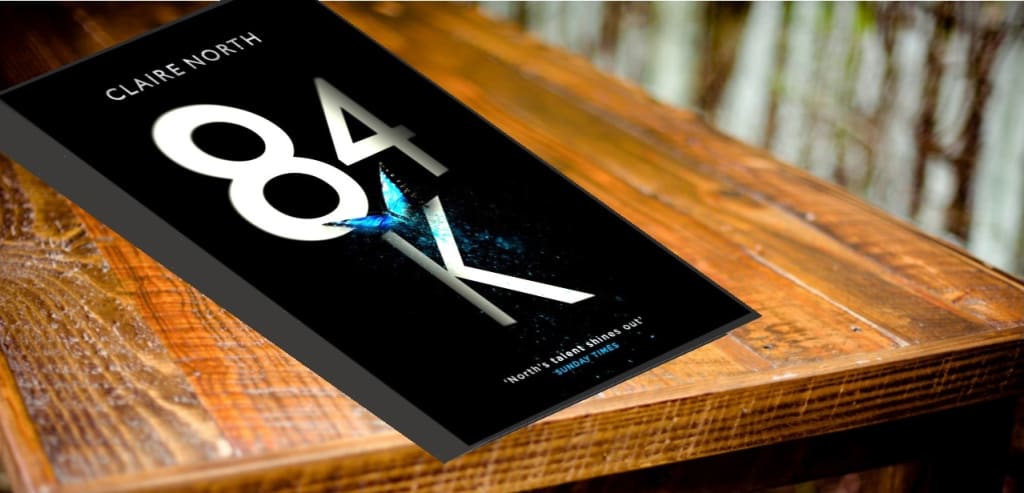Book Review: '84K' by Claire North
An Economic Dystopia that Squanders Its Potential

The near future of 84K is a world driven by money—it can make you and break you. Every possible service imaginable (police, hospitals, etc) can be accessed only by money. You need a subscription for everything. Not only that, if you have committed a crime, all you need to pay is an indemnity. No need for prison in the economy-driven dystopia.
Calculating the indemnities for all these crimes in the United Kingdom is the Criminal Audit Office, which is where we meet our protagonist, the man called Theo. Theo Miller is every person's personal nightmare—an office drone with no life and no personality. There's a reason for that, and we will find out eventually. Theo makes himself hard to remember and easy to forget, which makes his encounter with Dani Cumali extremely unfortunate; because Dani Cumali knows exactly who Theo Miller is. And so kicks off the events of this book, where Theo finds himself swept into a greater conspiracy that may unravel the fabric of this society. All for the want of a daughter.
I haven't read any of North's books, either under this pseudonym or as Catherine Webb, but there is no denying the beauty of language that resides in this book. 84K is never better than when the author is describing the characters' everyday lives—be it the humdrum nature of Theo's auditing, or the unpredictable life aboard Neila's boat, Hector. There is a tangibility to how this reality is painted, and that is precisely why, after reading the first five chapters, the finished product feels like a bit of letdown.
When North delves into the latent horrors of this world—that anyone regarded as less worthy can end up spending their entire lives on the "patty lines" (bonded labour for big companies); that the rich can continue committing any and every crime because they are the only ones able to afford the indemnities; that indemnities are lower if the victim is an immigrant, a patty, etc.; and that beyond it all there are the ragers, the screamers, the zeroes, who live on the fringes of society—it makes the book come alive. The trouble is, partway through Part 1, the book devolves into pages-long exposition, and Part 2 is an even more serious offender of that. People spend prolonged periods of time explaining their life stories to Theo, for little reason other than... plot purposes.
The author also relies heavily on the use of ellipses. Many conversationalists falter, and ellipses add a realistic quality to dialogue, but in this book, I often felt like the author didn't know how to finish the sentence, so she just left it as is in the hopes that the reader would fill in the blanks. Except, we didn't have enough information to fill in the blanks, and it made reading a joyless experience.
Far too late into reading did I realize what this book was trying to be—1984 with the action of Taken. There is all the pretension of 1984 yet with little of the clear-cut gravitas. It's also overlong, mostly because of the exposition. Comparing two books to each other is a sin, but after a while the parallels are unmistakable. The biggest problem is the need to make it an action-packed tale of revenge. Theo Miller could well be played by Liam Neeson if this book were to ever be made into a film. Of course, unlike Neeson's on-screen personae, Theo is merely a tool for higher, more competent powers.
Said powers happen to be an ex-patty line worker and an older woman at the mercy of her son. They do all the hard work, but Theo gets to be the hero. Herein lies my biggest grouse with the book—I am tired of reading lurid details of how women and girls are subjected to sexual violence, or have little or no recourse for such violence. The news is full of that stuff; fictional books do not need to follow suit. Throughout the book, I kept wondering what would have happened had the characters' roles been reversed. What if Dani's folks had a rich friend willing to sponsor Dani for a better life? Would Theo have ended up on the patty line and been sold/trafficked? Why is it that only the female characters in this book must face the eventuality of sexual violence and slavery? There is not a mention of something similar happening to any of the male characters? Does it mean that ALL women in the world of this book are seen as desirable commodities? Or, does the author think that every woman is the exact shape and size that is desirable by default (because they aren't)? It was frustrating to read. The constant insinuation that a child of 14 could be trafficked and the overwhelming threat levied on the male protagonist that there is a "market" for children like his daughter smacks of cliched tropes that we should have moved beyond in 2018. None of the women characters are individuals in their own right—all are defined by the men in their lives, or of what men have done to them in their lives. The death of female characters/the threat of violence on women characters are instigators for the male protagonist to act. Dani is a plot device; Helen a plot convenience; Heidi, a plot closer/nanny, and Lucy, the human MacGuffin ala every b-movie ever.
It constantly amazes me that women writers feel the need to diminish women and their characteristics. JK Rowling could have made Harry Potter a girl, but she chose not to. Instead, the only girl in the main three is an emotionless convenience. Hermione is great, but deserves better, even from her own creator. In 84k, the women are incredible characters, but never have the chance to shine because the author's focus is only on Theo; only on the actions of the men in charge. Wouldn't it have been refreshing had Neila turned out to be more than just a navigator? Or if Simon and Philip were Simone and Philippa? How about some out gay characters? What is this world like for trans and non-binary people? So many aspects of humanity could have been explored, but this rich world is reduced to being the story of yet another straight male with a saviour complex.
If not for the profusion of tropes and exposition, I feel this book would have exceeded all expectations. There is no faulting the vivid dystopian vision that North has created. It feels real and somewhat familiar, but it is unfortunately cemented over with a thin plot and cliched characters. I wanted Theo to be more than just a convenient action hero; far too many things go his way for him to survive, forget succeed, in this book. He is little more than an emblematic hero—a figurehead that thrives off the hard work and sacrifices of others to get to his destination. He is a complex character drowned by the plot.
This book had plenty of potential which it lay waste in lieu of a by-the-numbers story of anarchical empowerment. The poetic language is powerful, but often eclipsed by incomplete musings and thoughts. I really wanted to love this book—after reading the excerpt, I thought I was in love with it, but the complete picture wasn't as pretty as the pieces. This book is worth reading, but be wary of tropes and cliches.
About the Creator
Monita Mohan
When not dreaming of a one-way trip to Coruscant, I'm usually staring at a blank page, hoping my articles write themselves.
Website: lightspeedwriter.wordpress.com
Twitter: @Monita_Mohan






Comments
There are no comments for this story
Be the first to respond and start the conversation.